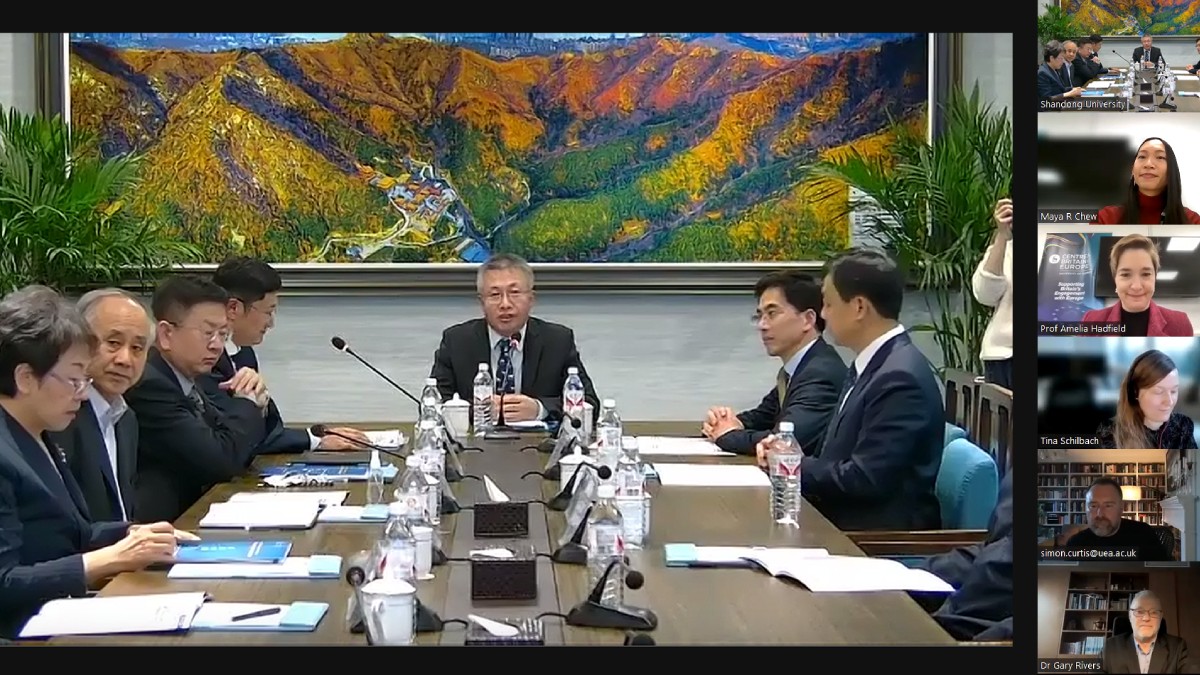East meets West: development, peace, and inner-civilisation exchanges
On December 8th, the University of Surrey and Shandong University celebrated their second collaborative forum, characterised not only by a pursuit of knowledge but also by the exchange of ideas. Distinguished scholars from both China and the UK gathered for this occasion, and among them was the esteemed Vice Mayor of Weihai Municipal Government, Mr. Zhao Baogang.

Mr. Baogang eloquently drew parallels between Confucian teachings and Western Classics, underscoring Weihai's recent accomplishments and its expanding global collaborations. Highlighting Weihai's remarkable standing as the 24th best city in China and the happiest city to live in, he attributed this success to the city's dedication to quality of life, environmental protection, and lower carbon emissions. Emphasising Weihai's commitment to global collaboration, he shared the city's ties with 52 cities in 21 countries and economic connections with over 200 nations, including collaborations with the UK.
Mr. Baogang stressed the importance of unity for long-term progress, showcasing China's commitment to a peaceful environment with initiatives in the Middle East and Africa. Inviting attendees to visit Weihai, he expressed optimism for fruitful discussions at the forum and concluded with gratitude and anticipation for its success.
Anthony Samuels, Chairman Emeritus of the Surrey Country Council, contributed to the forum by highlighting the significance of understanding differences while acting on commonalities. Drawing on his experiences engaging with Chinese counterparts, Samuels discussed the cultural geography between Surrey and Shandong, using the Yehudi Menuhin Music School as a symbol of cultural exchange. He also underscored the economic success of Liaoning, particularly the BMW plant in Shenyang, as a model for fostering similar relations between Surrey and Shandong.
The forum addressed critical themes in three parts:
Part I: Peace and Security
Professor Xu Jian explored the historical challenge of achieving lasting peace and outlined three types of peace—equilibrating hegemony, empire, and rights-based peace. Emphasising the evolution of international politics towards rights-based peace, he argued that conflicts over rights are more stable than those over power, highlighting the centrality of rights in identity politics.
Dr. Simon Curtis focused on China's emergence as a rising great power and its unique approach to international relations. He examined the Belt and Road Initiative (BRI) as a key component of China's strategy, expressing concerns about potential geopolitical implications and the creation of rival socio-technical systems. Despite differences, Dr. Curtis highlighted avenues for cooperation, such as addressing global challenges and leveraging transnational city networks.
Part II: Sustainability
Joel Reuben, Investment Director at Hampton Group, emphasised the urgent need for global collaboration on sustainability. He discussed China's role as the largest global emitter of greenhouse gases and the importance of collaboration with developed nations. Reuben examined the outcomes of COP28, expressing concerns about the investment gap and proposing a "just transition" for developing nations. He underscored the critical importance of East-West collaboration, particularly with China, in ensuring a sustainable future.
Professor Zhang Lijuan discussed the significant shifts in global manufacturing and industrial chains, focusing on the impact of low-carbon transition. She highlighted China's commitment to green development and its pivotal role in the global green and low-carbon supply chain. Zhang explored the role of multinational companies in facilitating low-carbon transition and called for strengthened global partnerships to achieve sustainable development goals.
Part III: Culture and Education
Professor Zhang Yunling explored the cultural underpinnings of China's industrialisation, digitalisation, and ecologicalisation. He challenged the view that Chinese culture hindered industrialisation and emphasised the integration of traditional Chinese culture for a broader concept of modernization. Zhang traced China's historical responses, discussed the Belt and Road Initiative, and highlighted the importance of innovation in Xi Jinping's cultural rejuvenation approach.
Dr. Tina Shilvak addressed the role of the higher education sector in promoting cultural dialogue and understanding between East and West. She discussed the challenges in measuring the cultural impact of partnerships and emphasised the need for cultivating cultural competence, empathy, and listening skills. Dr. Shilvak explored the concept of internationalisation at home, the trajectory of international students, and the importance of global cultural literacy. She called for a shift in higher education to provide training in speaking to different cultural worlds.